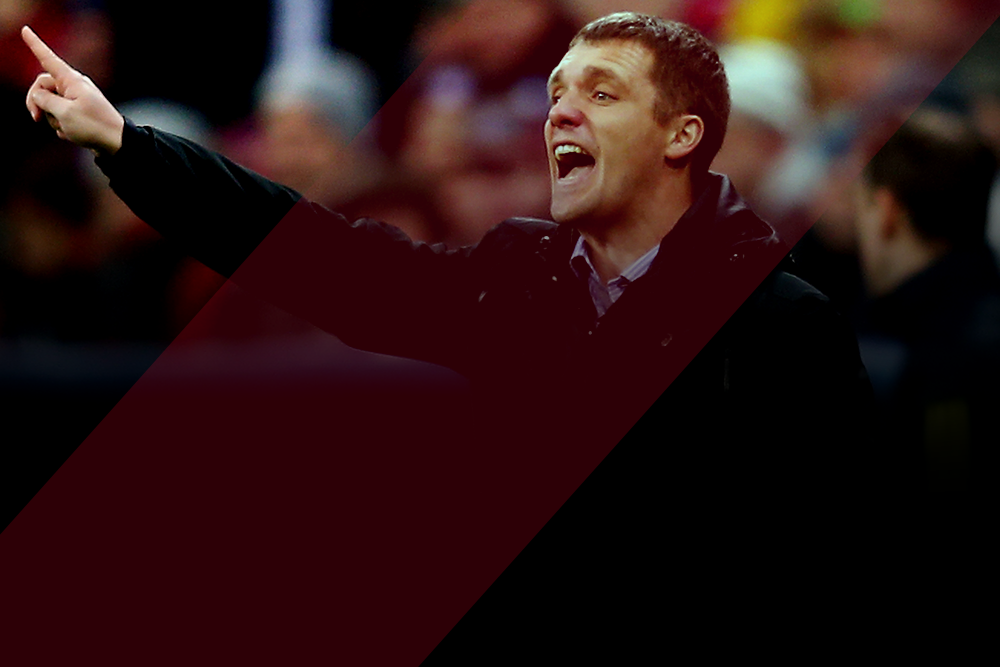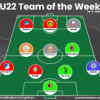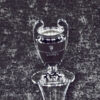
After 7 successful seasons at CSKA Moscow, Leonid Slutsky’s resignation in December 2016 leaves big shoes that need filling. So how is his successor Viktor Goncharenko getting along?

Like several European leagues, the Russian Premier League has over the last 26 years since the dissolution of the Soviet Union seen a variation of teams who have experienced a “Golden era”. The 1990’s belonged to one club, Spartak Moscow, who dominated Post-Soviet Russian football winning 7 out of 8 Championships between 1992 and 1999. The arrival of the 2000’s saw Russian football go from having 2 winners in 8 seasons in the 1990’s to having 5 different winners in 10 seasons. Seasons 2000 and 2001 saw Spartak continue their dominance, yet Lokomotiv Moscow ended their dominance in 2002 and also won a 2nd Russian Premier League title in 2004. The 2000’s also saw CSKA Moscow yield 3 championships in 2003, 2005 and 2006, plucky underdogs Rubin Kazan surprisingly win 2 consecutive championships in 2008 and 2009 and the emergence of nouveau riche Zenit Saint Petersburg who won their first title in 2007. Fast forward to the 2010’s and the arrival of a Spring-Winter format and 2 teams have emerged as the dominant forces in Russian football with Zenit (2010, 2011-12 and 2014-15) and CSKA 2012-13, 2013-14 and 2015-16) mopping all available championships.
CSKA’s success in this timeframe is attributable to their former manager, Leonid Slutsky. The 45 year old was appointed CSKA manager in October 2009 succeeding Spaniard Juande Ramos, who had endured a disastrous 6 week period in charge of the club. Slutsky’s appointment instantly changed their fortunes. Within months of being appointed, Slutsky had guided the Koni (Horses) as CSKA are also known to the Quarter Finals of the 2009-10 Champions League where they lost to the eventual winners, Jose Mourinho’s Inter Milan. It started a golden period where 3 Russian Premier Leagues and 2 Russian Cups were won, achievements made even more impressive considering that the club was having to compete against clubs with greater finances like Spartak and Zenit. Nonetheless, the 2015-16 season, Slutsky’s 6th full season in charge was also arguably his toughest as CSKA who had at one stage of the season a seemingly unassailable 10 point advantage over their adversaries, so nearly lost the championship to surprise package FK Rostov, only securing the title on the last game of the season. A torrid summer then followed for Slutsky who combined his role at CSKA with the Russian national team and resigned from the role of the latter after an abysmal UEFA EURO 2016 tournament and a group stage exit. The first half of the 2016-17 season became a struggle for CSKA who struggled both domestically to hang onto their crown and also in the Champions League where they failed to progress from their group, it all proved too much for Slutsky who resigned and left CSKA after 7 highly successful seasons after their final Champions League group game on 6th December. After just 6 days of searching for a successor, CSKA announced that Slutsky’s replacement would be a former assistant manager to Slutsky at CSKA, 39 year-old Viktor Goncharenko.
Who is Viktor Goncharenko?
Viktor Goncharenko was born on 10th June 1977 in Khoiniki, in modern-day Belarus, he had a modest playing career as a defender which was played entirely in Belarus at four clubs, Strlichevo Khoiniki, RUOR Minsk, RShVSM-Olympia Minsk and BATE Borisov between 1994 and 2002. At the latter of these clubs, he appeared 82 times in 4 seasons between 1998 and 2002, winning 2 Belarusian league titles in 1999 and 2002, 8 caps for Belarus at Under 21 level and was a former team-mate of Belarus’ finest modern day footballer, former VfB Stuttgart, Arsenal FC and FC Barcelona star Alexandr Hleb. At the age of just 25 in 2002, Goncharenko was forced to retire as a result of injury.
Immediately, Goncharenko turned his attention to coaching and between 2004 and 2007 served as BATE’s assistant manager before then being promoted to the managerial role full time in November 2007 upon the conclusion of the 2007 Belarusian season. Whilst some could argue that taking the reins of an already successful team (BATE had won the 2006 and 2007 Belarusian leagues prior to Goncharenko’s appointment) and continuing their success (BATE under Goncharenko won 6 consecutive domestic championships between 2008 and 2013) was good but nothing particular to be impressed by, Goncharenko’s achievements with BATE in continental competition launched him to the attention of observers across the continent. In 2008-09, Goncharenko’s BATE became the first club from Belarus to reach the group stages of the UEFA Champions League after overcoming Belgian side Anderlecht and Bulgarian side Levski Sofia in the qualifying rounds. At that season’s Champions League group stage draw, BATE could not have asked for a harder introduction to the elite level of European football as they were pitched in a group with European heavyweights Real Madrid and Juventus and the then defending Europa League Champions Zenit. Expected to be fodder to the above 3 teams pre-tournament, BATE performed admirably, tying both their group matches with Juventus, one of their group matches against Zenit and only suffering 2 narrow losses (2-0 and 1-0) against Real Madrid. Goncharenko also made history when he became the youngest ever manager of a team in a Champions League game at the age of just 31. Rather than being a flash in the pan, in the next 4 European football seasons under Goncharenko, BATE qualified for the group stages of the competition on 2 more occasions and achieved the most famous result in their history in the 2012-13 group stage under Goncharenko beating German heavyweights Bayern Munich 3-1.
Goncharenko quickly caught the attention of larger clubs and left BATE upon the conclusion of the 2013 Belarusian league to join Russian side Kuban Krasnodar in October 2013. The move however, was not a success and after just 12 months in charge, he was relieved from his duties in November 2014. A similar disappointing spell occurred for Goncharenko at his next Russian club Ural Yekaterinburg, where he spent only 6 games in the dugout of the club from the start of the 2015-16 season before once again having his contract terminated. Immediately after this disappointment, undeterred, Goncharenko then agreed to join CSKA Moscow as an assistant to Slutsky for the remainder of the season. In the summer of 2016, Goncharenko then got a third chance to impress in Russia when he got offered and accepted the job at FK Ufa for the 2016-17 season at a club who had narrowly escaped relegation from the Russian Premier League the previous season. It was crucial that Goncharenko succeeded in Russia this time at Ufa and his short spell was a case of third time lucky. Before his resignation as Ufa manager on 12th December 2016 in order to accept the CSKA managerial role, Ufa were lying 8th place out of 16 in a very congested mid-table of this season’s Russian Premier League, well away from any relegation danger. Most notable about Goncharenko’s achievements during his brief stint at Ufa, however, were the results he achieved against some of the biggest sides in Russia on a small budget including a 0-0 home draw against FK Krasnodar and back to back 1-0 victories away from home against the Muscovite giants Lokomotiv and Spartak. This successful stint combined with his time spent under Slutsky as an assistant at CSKA and his previous impressive record in Europe convinced CSKA owner Evgeny Giner to offer Goncharenko the job and a real chance to springboard his future managerial career.
Tactical Philosophy
Under Slutsky, it was very common to see CSKA line up in a 4-2-3-1 formation, which throughout the duration of my time watching CSKA’s matches last season was rarely ever adjusted. I watched 4 of CSKA’s friendly matches that the club played during the Russian Premier League’s long winter break between the first week of December 2016 and the first week of March. Under Goncharenko, the 4-2-3-1 that became synonymous with the club under Slutsky has been scrapped and replaced with a 3-5-2 formation, in a similar way to how Jose Mourinho’s 4-2-3-1 formation at Chelsea between 2013-14 and 2015-16 was replaced part-way through the 2016-17 season by Antonio Conte’s 3-5-2/3-4-3 formation to exceptional effect. In the balance of fairness before completing this article, I decided to watch the first 3 competitive games of Goncharenko’s CSKA alongside the friendlies as it would be impossible to make a full judgement on a manager’s tactical analysis due to the difference in intensity between friendlies and competitive matches. What was also ideal about CSKA’s first 3 competitive games under Goncharenko was that it was against 3 different level domestic opponents, Zenit, who like CSKA are one of the Russian Premier League’s leading lights, Tom Tomsk who are perennial strugglers and favourites to be relegated and Terek Grozny who are an archetypical midtable Russian Premier League side who occasionally qualify for the Europa League at the end of a season.
For the first game after the Russian league’s winter break against Zenit at home on 04/03/17, Goncharenko selected the following starting line up.
One of the strengths of deploying a 3-5-2 formation is that a team can deploy 2 forwards. One of the criticisms of 4-2-3-1 is if the tempo is too slow or if the passing into space is not fluid enough, a lone striker can get isolated and can cut a frustrated figure who is starved of service. With 2 strikers, one can operate a little deeper than the other, acting effectively as a bridge between the midfield and the attack which links up attacking moves more effectively. Another advantage of 3-5-2 is that 3 central midfielders can be deployed, preventing teams in the vast majority of games they play from being outnumbered in midfield. Under Slutsky, CSKA used to play at a slower pace with a large emphasis on ball retention, a narrow playing style with both wide players and fullbacks coming inside whilst attacking and patient probing from the midfield before slipping a through ball to their strikers. In a continuation from CSKA’s mid-season friendlies, the match against Zenit highlighted that things will be considerably different under Goncharenko. Throughout the game, CSKA continuously looked to use the flanks to launch their attacks, crucially, there was also a variation in their attacking style. Sometimes, the wingbacks Fernandes and Shchennikov after they had beaten their opposing player on the flanks floated a high cross into the box for the 2 strikers. Sometimes one of the two strikers came out to either of the wingbacks in support to play a quick one two with them before the wingback then underlapped the striker who had come out wide and drilled a low, hard cross into the box. Furthermore, more emphasis is placed on a more direct style with longer passes to the flanks. Crucially, Goncharenko has developed predictability in the areas of the pitch he will look to launch attacks (the two flanks), but variation in the sense that a variety of different crosses (low and drilled/high and floated) are utilised.
One trait Goncharenko has followed on from Slutsky is making CSKA a difficult side to defeat. Goncharenko’s spell at Ufa earlier on in the season is evidence of this, in the 17 games he was in charge of his previous club, Ufa conceded just 13 goals. Very impressive considering after Ufa conceded 6 goals in their opening 4 Russian Premier League matches, they then kept 4 consecutive clean sheets including two impressive 1-0 away wins against both Lokomotiv and Spartak. For a small club like Ufa, this really does make people get up and notice. The Zenit game highlighted Goncharenko’s defensive prowess when after 70 minutes of the game, CSKA’s defensive midfielder Pontus Wernbloom was sent off for two bookable offenses. Faced against a strong opponent like Zenit and a man down, the chances of CSKA escaping with a point looked slim, yet they impressively closed hatches, denying Zenit a victory in a match which finished 0-0.
Flexibility in the wide areas:
Another advantage of Goncharenko’s 3-5-2 is that the personnel deployed in the wide areas can be adapted depending on the strength and type of opponent CSKA faces. In the Zenit match, the two players deployed as wingbacks were two fullbacks equally as adept at defending and attacking to ensure balance in a tight game. Goncharenko’s second league match was against relegation threatened Tom Tomsk. Immediately, faced with a weaker opponent who were going to flood the midfield and park the bus to attempt to escape with an unlikely point, Goncharenko opted to play a winger on the left flank in Serbian Zoran Tosic who replaced a fullback in Shchennikov. In a match which CSKA dominated and won 4-0, Tosic slotted into the wingback role on the left flank with ease, combining well with central midfielders Alan Dzagoev and Alexandr Golovin and Brazilian forward Vitinho who like the forwards in the previous game came wide from time to time to play quick one-twos before then underlapping his partner and putting crosses into the box. In Goncharenko’s third league match, an impressive 1-0 away win against mid-table Terek Grozny, Fernandes and Tosic were the wingbacks selected by Goncharenko once again and both were outstanding all game with impressive contributions in both defence by helping shield the 3 central defenders and in attack with their quick combination play on the flanks. It was an underlapping run and low drilled cross into the box by Fernandes on the right flank which resulted in CSKA forward Alexey Ionov stabbing home the winning goal of the game from just a few yards out after a brief goalmouth scramble.
Flank to Flank Smother Press:
One feature maintained in the transition from Slutsky to Goncharenko is a high work rate and high pressing game up the pitch. What is noticeable however, is that because only 1 striker pressed the opposing 2 central defenders in Slutsky’s 4-2-3-1 formation, the opposing defence would often still have a “get out ball” pass that they could use to find one of their central midfielders without having to aim a risky pass 30-40 yards up-field. The last 2 CSKA games against Tom and Terek, 2 opponents weaker than CSKA, highlighted another advantage of having 2 strikers as it enables a team in tandem with 2 advanced wingbacks to employ a Flank-to-Flank Smother Press. Both attacking wingbacks can press the opposing team’s fullbacks and the two central strikers press both opposing central defenders. A team can still with a good pass find a central midfield player and alleviate the press, however, it is harder when the press is well supported from flank to flank and it also has the added advantage on many occasions of keeping the 2 central defenders deep. When you have one striker pressing 2 centre backs, there is often room for 1 of the 2 central defenders to evade the press, be able to step out of line with his defence and bring the ball out which in turn allows that team’s central midfield to push further up the pitch themselves. With both central defenders and fullbacks smothered in deep positions, the midfield also has to drop deep, which allows the pressing team to maintain a perfect shape as their 3 man defence can stay deep and two of the 3 man midfield can also stay in a deep-middle of midfield position where they can cover either flank in case a long ball from the smothered defence does find a winger running into space. In CSKA’s last fixture before the international break, Terek’s defence struggled to get up the pitch which resulted in their midfield being pinned deep and as a result, CSKA’s 3 central defenders and goalkeeper Igor Akinfeev were barely troubled all game.
Interchanging midfield roles:
Whilst Goncharenko does place emphasis on attacks down the flanks more than his predecessor, 2 of the 3 central midfielders play an important role in CSKA’s attacking set-up under Goncharenko. Like Slutsky, one of the 3 central midfielders (Wernbloom) is the holding midfielder sitting in front of the 3 man defence. The other 2 central midfielders, Alan Dzagoev and Alexandr Golovin are further up the pitch on different sides. Depending on which flank the attack is going down one of the two will push further up the pitch and look to support the attacking wingback. The other one of the two will stay in a similar position to where he was prior to the attacking move, which gives him the ability to both restart attacks from deeper should the attack down the chosen flank fail and also to instantly launch an attack down the opposing flank or drive into a central position just outside of the opponent’s penalty box to launch an attack centrally. Should the latter of these two scenarios occur, the advanced central midfielder on the flank where the attack broke down can simply just drop into the role on the other side of the pitch vacated by his team-mate. This enables CSKA to be flexible with their movement and positioning alongside being in a good disciplined shape to prevent counter-attacks by the opposition. Both Golovin and Dzagoev are good players technically with their ball control, dribbling and short-medium range passing, which allows them to interchange roles with ease in this system. Furthermore, both have experience of playing in deep midfield playmaking and attacking central midfield roles under Slutsky, so these roles should be easy to adapt to.
Three Career-Defining Games
13/08/2008 & 27/08/2008 – BATE Borisov v Levski Sofia, UEFA Champions League Third Qualification Round – BATE win 2-1 on aggregate:
This was the game that first earmarked Goncharenko as a future coach to watch as he guided BATE Borisov to the group stages of the UEFA Champions League for the first time. Despite a shock victory over Belgian giants Anderlecht in the previous qualification round, BATE went into their match against Bulgarian champions Levski as underdogs, yet they went away to Sofia in the first leg of their third and final round of qualification tie and came away with a 1-0 victory courtesy of a goal by young 21 year-old Russian defender Vladimir Rzhevsky. The return leg in Belarus saw BATE take a 1-0 lead courtesy of Sergei Sosnovski in the 14th minute, BATE appeared to be cruising to the group stages of the competition before an equaliser from Levski in the 38th minute and a red card for BATE’s striker Gennadi Bliznyuk just before half time threatened to spoil the BATE fairytale. However, BATE demonstrated a strong trait of Goncharenko throughout the remainder of the game as they remained compact and well organised defensively alongside a few excellent saves from 19-year old goalkeeper Alexsandr Gutor to hold out against Levski’s pressure and ensure that for the first ever time, Belarus would have a participant in the group stages of the Champions League.
02/10/2012 – BATE Borisov 3-1 Bayern Munich, UEFA Champions League Group F, Matchday 2:
If achieving a shock qualification for the Champions League in the 2008-09 season with the victory over Levski was a first sign of future potential for Goncharenko, his and BATE’s exploits in the 2012-13 group stages of the Champions League further demonstrated that potential and proved that the results in the 2008-09 season were more than just a 1 season wonder. On Matchday 1 of their Champions League group, BATE stunned French side Lille recording a famous 3-1 victory away in France. However, whilst that was a notable scalp, it was nothing compared to what happened next, as BATE then stunned observers worldwide on Matchday 2 by recording a stunning 3-1 victory over that season’s eventual Champions League winners Bayern Munich. Goals from Alyaksandr Pawlaw, Vitali Rodionov and Renan Bressan ensured that BATE became one of only 2 sides alongside Arsenal to defeat Bayern in that season’s competition. BATE lost their remaining 4 group matches after their opening 2 victories over Lille and Bayern. However, they finished third in their group ahead of Lille and ensured Europa League football after Christmas, a rarity amongst clubs in Belarus.
19/03/2017 – Terek Grozny 0-1 CSKA Moscow, Russian Premier League – Matchday 20:
This match represented a crucial victory for CSKA Moscow in only Goncharenko’s third competitive match in charge of the club in a variety of ways. CSKA did not convince in their first match at home against Zenit after the long winter break (Goncharenko’s first match) escaping with a draw and they were always expected to overwhelm relegation favourites Tom Tomsk at home in their second match post winter break. So a convincing performance was needed by Goncharenko to give optimism that he can fill the void left by Slutskiy at the club. Furthermore, Terek up until this game had been having an excellent season, lying in 4th place in the table, so it was always going to be a tough test for CSKA. Finally, Terek over the last few seasons at their home ground dealt many large Russian clubs significant defeats. Yet, despite the scoreline only showing as a 1-0 victory for CSKA, it was as convincing a 1-0 as you will find, CSKA could have had more goals throughout the game, they completely dominated the midfield and were impressively solid in defence. A victory and more importantly a performance that will give CSKA fans hope for both the remainder of this season and the next few seasons that Goncharenko will adequately fill Slutskiy’s boots.
Three Key Players Developed
Sergey Krivets – 30 year old midfielder who was originally signed from Lokomotiv Minsk in 2006 at the then age of just 20, Krivets went on to establish himself as a key player under Goncharenko at BATE as the club embarked on their European adventures in the late 2000’s. After impressing at BATE with 28 goals in 92 league matches, Krivets got his move to Polish club Lech Poznan in December 2009. After 2 seasons in Poznan which yielded a Polish league title in 2009-10, Krivets then went on to play in the Chinese Super League for a season for Jiangsu Sainty in 2012 before returning for a second stint at BATE in 2013 and then getting a move to French side Metz in 2014. Currently playing for Polish side Wisla Plock, Krivets made his debut for the Belarus national team in 2008 and currently has 37 caps.
Vitali Rodionov – Veteran 33 year old who was signed in 2006 by Goncharenko’s BATE at the then age of 22 from Torpedo Zhodino. Has with the exception of a brief loan spell at German club SC Freiburg in the latter half of the 2008-09 Bundesliga season remained at BATE ever since. Twice voted as the best forward in the Belarusian league in 2010 and 2011 and its top scorer in 2008 and 2013. The top scoring Belarusian player in European club football competitions with 20 goals and the winner of 46 caps for the Belarus national team.
Mikhail Sivakow – 29 year-old who came through the youth set-up at BATE making his debut in 2005. At the age of just 21 in January 2009 after just 36 first team games for BATE, Sivakow signed for Italian side Cagliari. Has since had spells at Piacenza, Wisla Krakow, Zulte Waregem, a second spell at BATE, Gomel, Chernomorets, Gabala, Zorya Luhansk and FC Orenburg, the latter of which is where he is currently playing. Part of the Belarus Under 21’s team that came third at the 2011 UEFA Under 21’s European Championship who by virtue of this performance subsequently won the right to play at the 2012 London Olympic Games. Made his debut for Belarus in 2010 and has since won 12 caps for the senior team.
Conclusion
Upon taking the reins at CSKA, Goncharenko inherited a difficult situation, the club was 8 points behind winter leaders Spartak in 3rd place in the Russian Premier League, had finished bottom of their Champions League group and had unconvinced all season with their league performances. Expectations for the remainder of the season would likely have been modest, with a minimum objective of finishing in the top 4 of the Russian Premier League and qualifying for next season’s Europa League. However, just 3 league games into his tenure at CSKA, Goncharenko has already lifted the pre-winter break gloom with 7 points from 3 games alongside quickly integrating the club’s returning loanee players and fitting the players into new tactics that they now feel comfortable in. They have leap-frogged Zenit into 2nd place and have narrowed the gap to Spartak to just 6 points. Even though a title win is unlikely for CSKA this season, writing them off would be foolish given their squad’s experience, the new manager boost and 6 of their remaining 10 matches being at home. Short-term, Goncharenko’s objective should be securing 2nd place in the Russian Premier League which would guarantee Champions League football for next season and much needed revenue for the club. Medium-to-long term, an objective for Goncharenko should involve matching Slutsky’s 3 Russian Premier League titles at CSKA and also improving on the club’s recent poor European performances by possibly having a run to the last 16 or Quarter Finals of the Champions League or Europa League.
Read all the other articles from this series here
- What could be the consequences of another lockout of the Champions League knockouts by Europe’s “Big Five” leagues? - November 24, 2020
- 2020-21 Serie A: U20 Young Players To Watch - September 16, 2020
- 2020-21 La Liga: U20 Young Players to Watch - September 12, 2020

























































